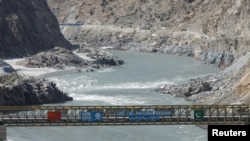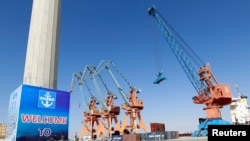China and Pakistan agreed Wednesday to boost cooperation under Beijing's Belt and Road Initiative, signing a much-delayed key deal to construct a multibillion-dollar railway project in the South Asian nation.
Chinese Premier Li Qiang and his Pakistani counterpart, Anwar-ul-Haq Kakar, held bilateral talks Wednesday on the sidelines of the Beijing-hosted Belt and Road Forum before witnessing the signing of several memorandums of understanding and agreements under the China-Pakistan Economic Corridor, or CPEC.
"The two leaders discussed bilateral collaboration in the context of the CPEC and prospects of further deepening economic linkages," said a post-meeting Pakistani statement.
The CPEC is a flagship project under the BRI. It is expected to bring more than $65 billion in Chinese investments in road, rail, energy, and other infrastructure developments in Pakistan to improve regional land and sea trade routes.
Officials said that one of the documents signed Wednesday was related to what is known as the Mainline-1, or ML-1, railway project. It is designed to connect Pakistan's northwestern city of Peshawar to the southern port city of Karachi through a more than 2,600-kilometer track with a price tag of $7 billion.
With Islamabad and Beijing sharing the cost, the project is expected to take 16 years and increase the line capacity from 34 to 134 trains each way per day, moving up to 165 kilometers per hour — twice as fast as they currently run.
Earlier on Wednesday, Kakar noted in his speech to the Belt and Road Forum international gathering that CPEC had played a "crucial role in generating new economic opportunities" in Pakistan since it was launched a decade ago.
"We have completed over 50 projects worth $25 billion under the CPEC," the prime minister said. "Pakistan has successfully operationalized its deep seaport of Gwadar with state-of-the-art facilities to handle cargo ships facilitating transshipment to regional countries, especially the landlocked states," Kakar added.
Mustafa Hyder Sayed, executive director of the Islamabad-based, nongovernmental Pakistan-China Institute, says the ML-1 is the biggest single project under the CPEC and is central to it.
"This project connects Xinjiang with Gwadar port and will unlock the access of Xinjiang to the warm waters to give it access to markets of the Middle East and Europe," Sayed said. "The ML-1 will be the key driving force and catalyst in the next phase of CPEC projects as its execution will help boost Pakistan's local industry, such as steel, cement and other local manufacturing," he added.
China has built and operationalized the deep-water southwestern Gwadar port on the Arabian Sea under CPEC investments. It is located near the Strait of Hormuz, a crucial oil shipping route in the Arabian Sea.
Kakar said a new international airport China is building in Gwadar would soon be inaugurated, turning it into a hub of regional trade and connectivity. He added that CPEC energy projects have injected at least 8,000 megawatts of electricity into Pakistan's national grid, and nearly 10,000 megawatts of additional and clean energy projects are expected to be completed within the next five years.
The CPEC is building industrial zones to attract local and Chinese investors, enabling cash-strapped Pakistan to increase its exports and boost its foreign exchange reserves.
Pakistan's mineral-rich southwestern province of Baluchistan, which hosts Gwadar, has seen significant CPEC-related investments despite a years-long ethnic Baluch separatist insurgency.
Chinese nationals working on CPEC projects, including Gwadar, have come under deadly attacks in Pakistan. Beijing has pressed Islamabad to ensure the security of its citizens.
Although China’s BRI investments have led to the construction of much needed infrastructure in Pakistan and elsewhere, there has been heated debate over the debt that such projects create and the political influence it gives Beijing.
In an interview published on Tuesday, Kakar told a Chinese media outlet that China's development financing "is without conditions and different from traditional development financing models." He dismissed allegations that the BRI had led participating nations into "debt traps."
"It is wrong to describe BRI financing as a 'debt trap;' it is rather an essential tool for helping countries in achieving comprehensive and inclusive development of their peoples," Kakar asserted.
Pakistani government data indicates that CPEC has created 200,000 jobs, built more than 1,400 kilometers of highways and roads, and added thousands of megawatts of electricity to the national grid, effectively ending years of power outages in the country of about 241 million people. According to officials, the port of Gwadar has handled 600,000 tons of cargo in the last 18 months.
In the run-up to this week's international gathering in Beijing, the Chinese government published a report documenting progress under its BRI financing.
"Major projects along the China-Pakistan Economic Corridor are underway," the so-called white paper said. "The Gwadar Port in Pakistan has seen major progress and is marching towards the goal of becoming a logistics center and industrial base," it added.
The report listed, among several completed projects, two nuclear power plants the two countries have jointly constructed in Karachi, saying they "are in operation, utilizing China’s Hualong One nuclear technology."







